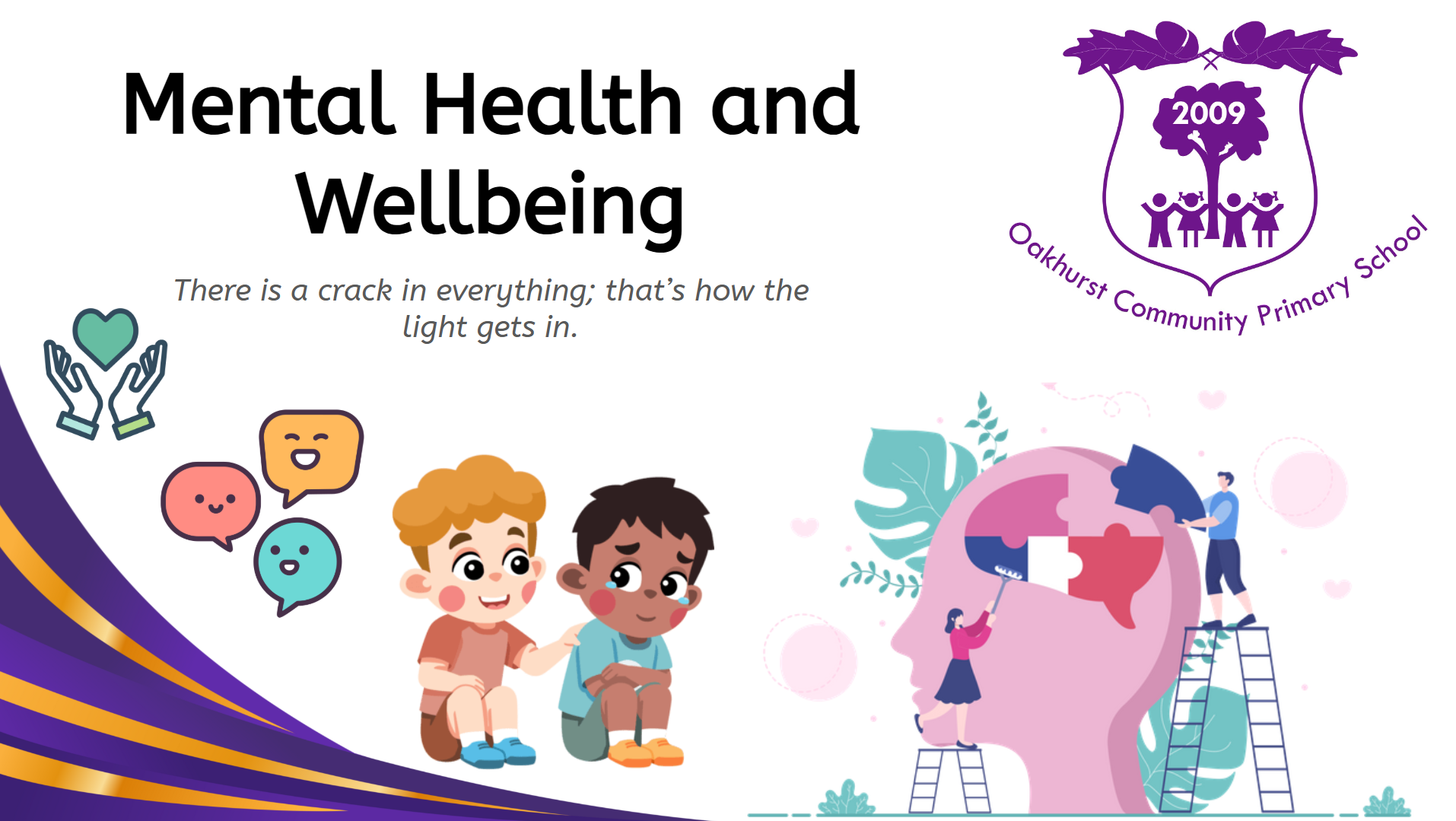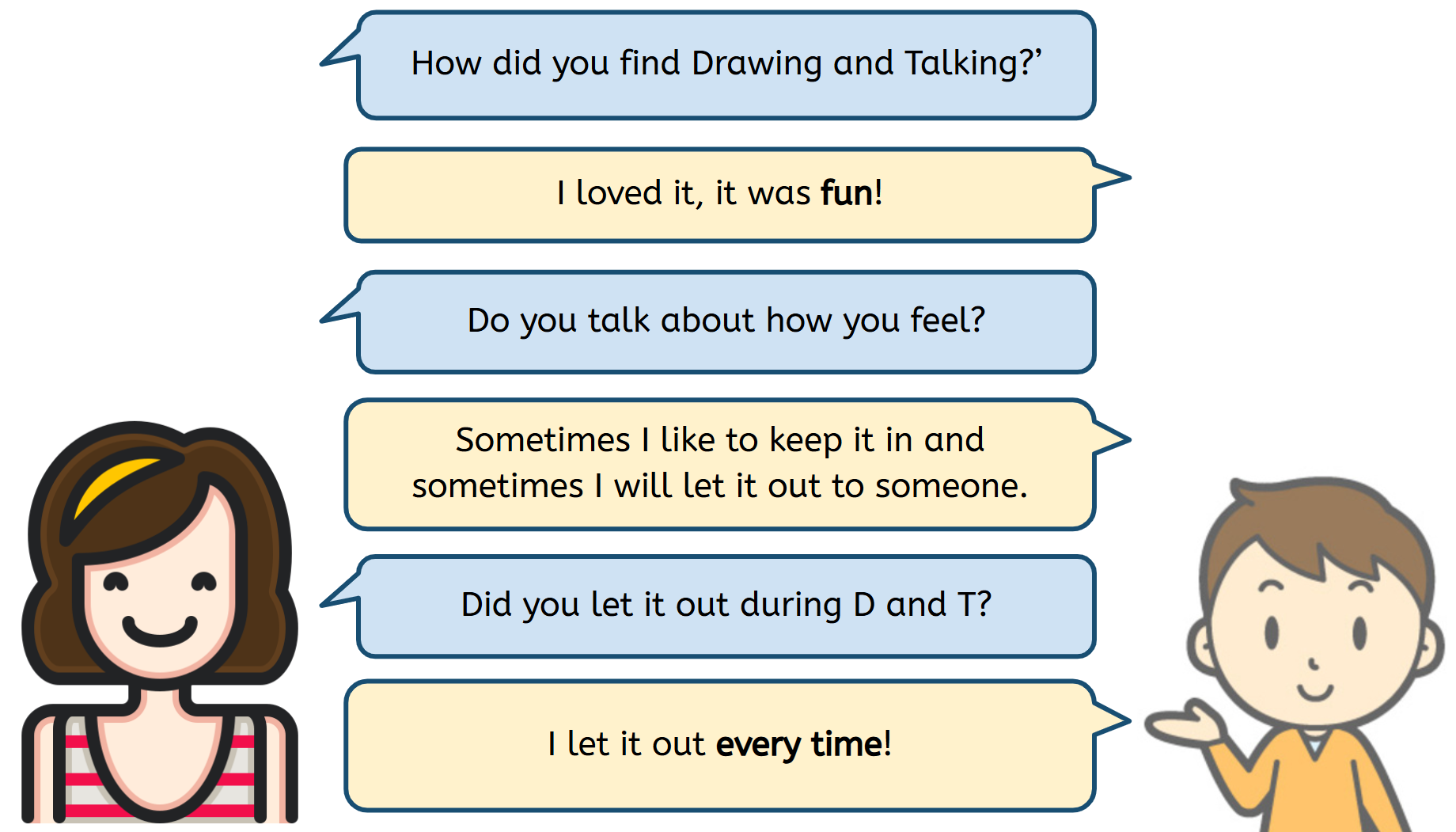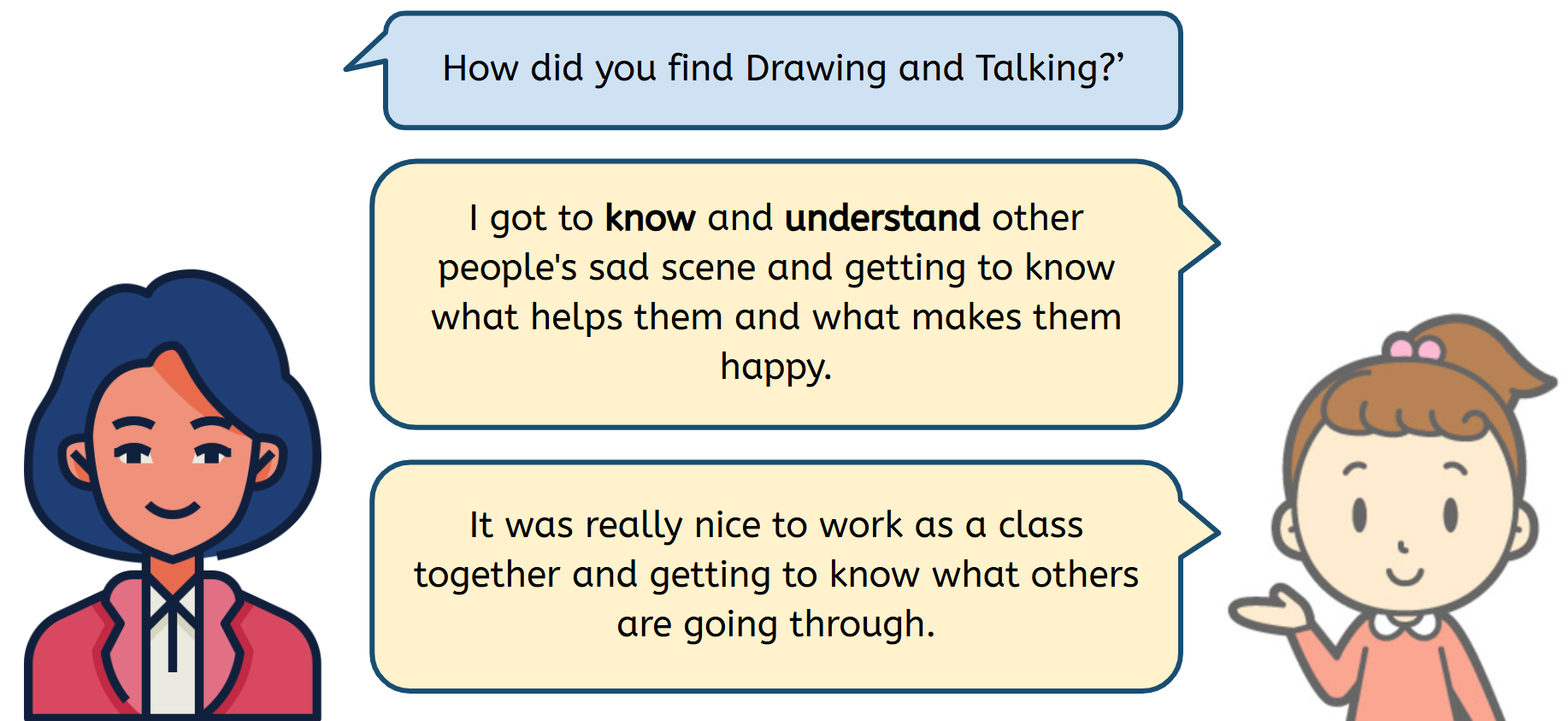Mental Health and Wellbeing
At Oakhurst Community Primary School, we place a lot of emphasis on the importance of mental health and wellbeing. This means that we are not only considerate of pupils’ mental health and wellbeing, but also the mental health and wellbeing of every member of the school community.
Key Considerations
- The rationale behind why we must continually improve our culture and practice
- Understanding the presentation of an unmet mental health need and identifying the ‘Silent Sufferer’
- Being proactive rather than reactive in practice and investing in the longer-term outcomes for children
Rationale
- A key component of safeguarding
- Reduce the clinical level of need
- Reduce lengthy waiting lists for mental health services
- Reduce the number of young people who die by suicide
- Improve overall outcomes for children
- Reduce the number of young people who self-harm or engage in alcohol and substance misuse
Reactive and Proactive Provision
At Oakhurst Community Primary School, we have a range of both reactive and proactive provisions that are deployed in response to a child exhibiting that they may be experiencing mental health or wellbeing challenges.
Reactive Provision
- Emotional Literacy Sessions
- One-to-one Drawing and Talking therapy sessions
- Child and Adolescent Mental Health Services (CAMHS) referrals
- Be U Swindon referrals
Proactive Provision
We strive to meet need at a subclinical level. The purpose of this is to try and reduce the number of children reaching crisis point. At school, we think about mental health in the same way we do with any of our other subjects such as maths, English, geography etc.
- All Key Stage 2 (KS2) children are screened annually for mental health and wellbeing
- Whole class Drawing and Talking (D&T) for every year group, every year as part of our curriculum offer
- Mental Health Day at the beginning of every academic year (start as we mean to go on!)
- Quiet, safe spaces for children to go
- Access to emotionally available adults
- Intervention tailored to the needs of each child so that children feel empowered to manage the demands of the school day and its curriculum
- Time built into individual’s timetables for them to exert excess energy
- Language for behaviour and emotions programme
- A bespoke Personal, Social and Health Education (PSHE) curriculum
- Mediating Learning Support Assistance (MELSA)
Whole-Class Drawing and Talking
As part of our bespoke offer and something that we are proud to say that we build into the experience of our young people is Whole-Class Drawing and Talking sessions each academic year.
What is Drawing and Talking(D&T)?
- 30 minute session where children draw and talk to their partner / class.
- 6 weeks where each week is themed to address different experiences in their lives.
- Works on the internal world with the support of a trained facilitator.
- Time after the session is protected for individual children to speak to the facilitator one-to-one.
Why is this such an important part of our provision?
Investing in long term gains is important to us - what will our children in Year 1 look like as young adults having had proactive provision? We want to be pioneers in facilitating a culture shift; we aim to raise the importance of putting aside time to offload any worries or thoughts that impact our wellbeing. Allowing time within the curriculum to work on the subconscious mind is important in modelling to children that allowing protected time to express themselves emotionally and mentally is valuing our mental health as much as our physical health. Normalising this as part of our practice is important to us.
Identifying and supporting ‘Silent Sufferers’
We aim to capture those ‘silent sufferers’ who we may not have identified, but have helped without knowing. Otherwise, these individuals are at risk of ‘slipping the net’ and going on to develop mental health or wellbeing challenges that require more significant engagement.
We provide children with the tools and methods to work through their emotions through Drawing and Talking year on year.
Examples of Drawing and Talking in action
A child draws themselves and their family around the hospital bed. In the bed was her uncle.
This was their favourite person.
The following week, they draw themselves sitting around the dining room table where their Mum is announcing that her brother is in hospital as a result of a car crash.
This was the child’s scariest memory.
A practitioner’s account: during the sequence of sessions
“Each week X has asked to come and speak to me separately and it's always been about her uncle being ill after a car accident. This week, ten minutes before the end, another adult took X out to find out what was bothering her, even though I knew she was waiting to speak to me at the end separately. X then came to talk to me about how her uncle had died at the weekend and she had a really long chat with me, going into detail about her feelings, what happened and what she's seeing and hearing.”
A practitioner’s account: after the sessions had concluded
“X asked to talk to me today. She said - and these are her words - 'I keep feeling like there is a monster chasing me and it's behind me and I feel it touching my head.' I asked her how it makes her feel and she said, 'I feel scared because when I look it's not there,' and then she continued, 'the other day I was running and my friends asked me why I was running and when I looked I realised my friends weren't even there.' I asked her if she had spoken to mum at all about how she was feeling and she said 'I haven't because mum doesn't like talking about those things.' She also said 'I also look at the clouds and it's like they are smiling at me.”
What do our pupils say?


What do our parents and carers say?
Testimonial One
“The support provided by the team has been excellent and has really helped our son to open up about some issues he was keeping bottled up.
The team have provided X with tools he can use to monitor his own feelings and moderate his reactions to certain situations.
Overall, we've seen a notable difference in his sleep and being more settled since he started the sessions with the SENDCO team and we're really grateful for the communication and information provided, giving us actionable tips about how we can continue the support at home. Thank you.”
Anonymous (Parent of a child in Year 6)
May 2024
Testimonial Two
“Oakhurst Community Primary School have provided our daughter with excellent mental health support over the years.
After her sibling passed away, they were proactive in arranging Drawing and Talking therapy and ELSA, plus looking to outside agencies for support. This helped enormously.
They are also very supportive of us as a family. More recently our daughter has struggled with anxiety and again the school were brilliant in helping her into school, we couldn't be more grateful.
School is now her safe space and all the staff are aware of her needs and keep us updated on a regular basis. Thank you Oakhurst!”
Anonymous (Parent of a child in Year 5)
May 2024
Testimonial Three
“My child has been so lucky to have such a committed and caring staff team at Oakhurst. They identify and recognise her mental health needs and work in partnership with us as parents to provide the best for her.
It is a holistic approach to supporting mental health at Oakhurst and the staff team are constantly evolving and developing the provision that they offer.
A huge thank you to all the staff for putting mental health at the forefront of children's wellbeing and education."
Anonymous (Parent of a child in Year 5)
March 2024
How can I find out more?
We are always more than happy to help.
If you have any queries, or you would like to find out more, please use the Enquiry Form found by navigating to the ‘Contact Us‘ tab on the main menu. Alternatively, you can direct your query to admin@oakhurst.swindon.sch.uk and we will put you in contact with the relevant member of staff.

